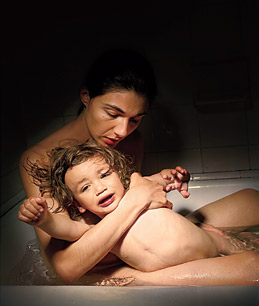
(2 of 2)
In the infinitely more complex human world, of course, there's much more to it than that. One reason women may be more attuned to health issues, according to some researchers, is simply that their biology gives them more reason to be. "Women go through their childbearing years and are told to have regular checkups," says Patricia Braus, a public-health expert and author of the book Marketing Health Care to Women. "They're more likely to keep up a relationship with their doctor. Men drift away and don't come back until their 40s or 50s, when they have concerns like prostate cancer."
For women, what starts as attentiveness to their own health soon extends to the entire family. In one oft-cited study, Norcross and his colleagues asked men and women in doctor's offices why they were there and if anyone had encouraged them to come. Men were 2.7 times as likely as women were to say they were prodded by a member of the opposite sex. Now that more women practice medicine, Norcross has found that they are equally persuasive when they're the ones wearing the white coats. "I'm an assessor of clinical performance," he says. "There are a lot of pieces of data that suggest that the performance of women is better than that of men."
At home, women press this natural authority across the familial landscape. A body of work about sibling relationships shows that adult sisters are likelier than their brothers to be "kinkeepers," looking after the entire family's health, particularly when it comes to aging parents. And as the Nepalese learned, there is almost no calculating how much good a grandmother can do. "In traditional societies, there are well-documented behavioral and cognitive benefits of having grandmothers in the home," says Hrdy. "Recently, behavioral ecologists have also found that in countries with high child mortality, there is actually an increase in survival when grandmothers live nearby."
Family experts caution, however, that the father's contribution should not be minimized. "Our definition of care is very matricentric," says Sarah Allen, an adjunct professor of family studies at Montana State University and the mother of two boys. "But fathers are involved in all sorts of ways we don't see. It's fine to say that women spend 80 cents out of every dollar that goes to health, but who earned that 80 cents in the first place? Often it's the father." Allen cites studies showing that the incidence of asthma, obesity, drug use and early sexual activity all rise in households in which a father is not present. In some cases, this may be due to little more than the loss of the father's paycheck, but whatever the reason, a present-and-accounted-for dad usually leads to healthier kids.
Still, women do most of the hands-on work, and it's too rarely asked how this primary-caretaker arrangement works out for the caretakers themselves, particularly in households in which both parents work. Must mom always come home, drop her briefcase and begin her late shift as parent, wife and family doctor? To distribute the quotidian work of managing a family's health more equitably, Braus urges improved health literacy for both parents, which means not only understanding the whole family's medical needs and history but also knowing personally all the kids' dentists, eye doctors and other health care providers. If a child is 2 and one of the parents (usually the father) is meeting the pediatrician for the first time, that's a problem. "You need a real relationship with the doctors," says Braus. "And this must mean both parents."
Dads may get there yet. In an increasingly egalitarian culture, one that encourages hands-on fathering, paternal involvement in family health may become like unemployment during a recession — a lagging indicator that eventually catches up with the rest of the changes. For mothers, who have borne the health burden for millenniums, that particular change can't come too soon.